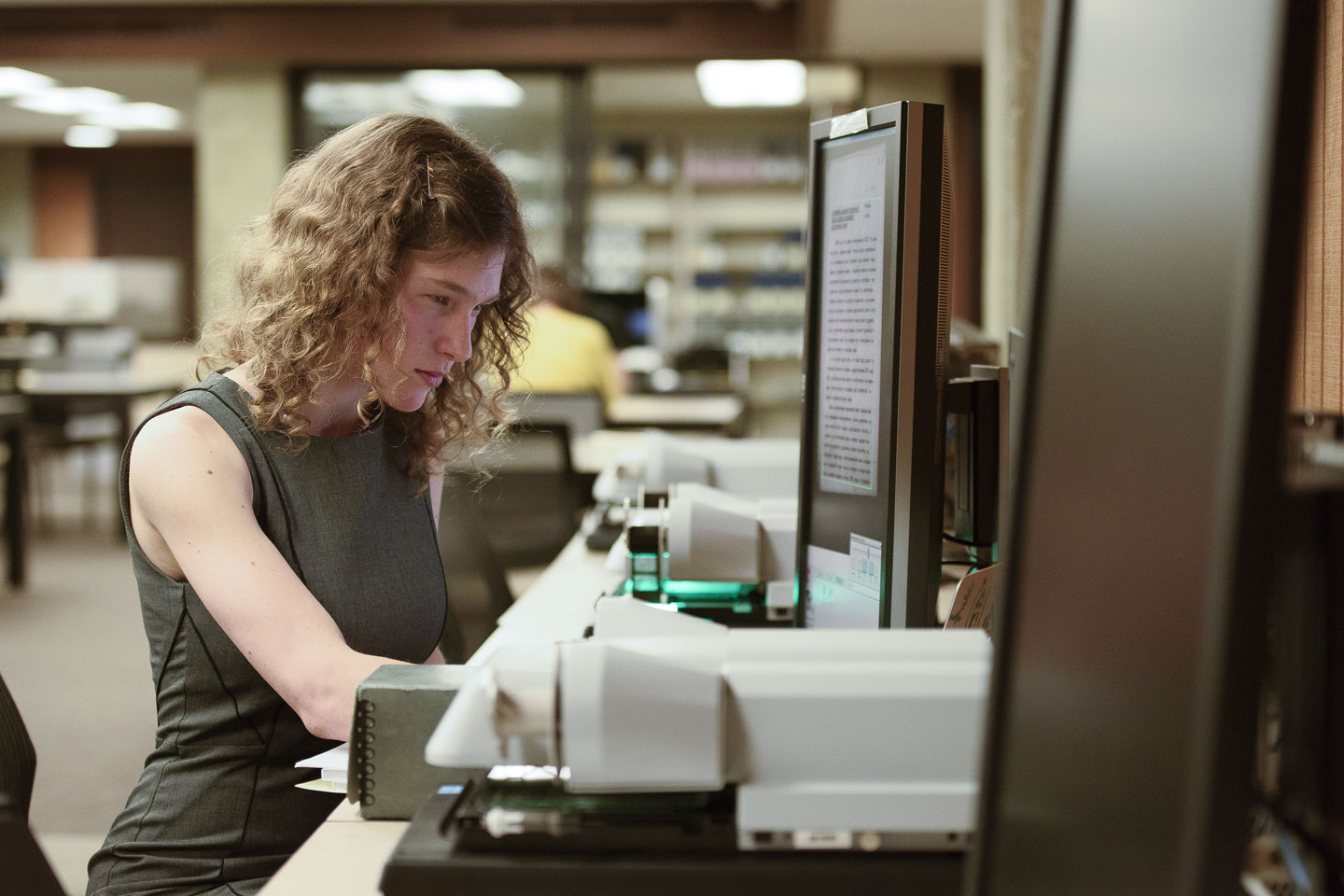Iranian Studies Program cultivates student’s passion for history
As an undergraduate in the Iranian Studies Program, Anna Polishchuk translated top-secret documents from the Soviet Union as she researched the relationship between Iran’s pro-communist groups and the Soviets during the 1979 Iranian Revolution.
Anna Polishchuk has been interested in history, arts and culture since she can remember. But when she stepped onto the Stanford campus for the first time in 2011, she wasn’t sure what path her studies would take.
“I took whatever classes I found interesting,” Polishchuk said.
She didn’t expect that about four years later she would be studying top-secret documents from the Soviet Union about the Iranian Revolution of 1979 in the basement of the Hoover Institution.

Anna Polishchuk’s interest in Stanford’s Iranian Studies Program led her to archival collections at the Hoover Institution to examine top-secret Soviet documents related to the Iranian Revolution. (Image credit: L.A. Cicero)
The road to that research opportunity began after Polishchuk accidentally stumbled on courses offered by Stanford Global Studies’ Iranian Studies Program.
Polishchuk said she became curious about Iran after taking history courses early on as an undergraduate. She then took a course on Iranian cinema and another on contemporary politics of Iran with Abbas Milani, the director of the Iranian Studies Program.
Her curiosity about Iran and the region persisted, leading her to become the first student at Stanford to graduate with a minor in Iranian studies, according to the program’s administrators.
“I realized just how relevant and influential the ancient history of that region still is, and I was hooked,” Polishchuk said.
She said what intrigued her most is the relationship between Persia, or modern-day Iran, and Russia, which is Polishchuk’s native country.
In the archives
Yearning to use her Russian language skills, Polishchuk chose to research the relations between Iran and the Soviet Union leading up to and during the Iranian Revolution of 1979, which was documented in the archival collections at the Hoover Institution.
Instead of relaxing during her last summer at Stanford, Polishchuk spent most days in the archival rooms in the Hoover Institution’s basement sifting through indices, scanning microfilms onto her flash drive and taking notes.
Many documents contained cumbersome, bureaucratic language, which required a long time to decipher and understand. She translated around 30 pages of memoranda sent internally within the Secretariat of the Communist Party of the Soviet Union.
The experience was challenging but extremely rewarding, Polishchuk said.
“I was working with documents that nobody has translated before so it was very exciting,” Polishchuk said.
Polishchuk read over 400 pages of archival documents regarding the Soviet Union and the Tudeh Party in Iran, a communist organization instrumental in ending the country’s monarchy system.
One highlight for Polishchuk was reading previously top-secret documents, including resolutions made by the Soviet Union about its support of Tudeh and the diaries of a KGB agent who was stationed in Iran.
“The childish part of me got excited by seeing the ‘top secret’ stamp on top of the documents I read,” Polishchuk said.
Polishchuk was particularly interested in reading and translating correspondence between the Soviet Union’s leadership and Massoud Rajavi, the head of the People’s Mujahedin of Iran, which the U.S. State Department identified as a Foreign Terrorist Organization until 2012.
In a 1985 letter to former Soviet President Mikhail Gorbachev, Rajavi admitted to several crimes his organization committed in Iran and asked for $300 million in assistance. That letter has been widely available and analyzed by historians, but the Soviet Union’s response to that letter had hardly been examined until Polishchuk translated and analyzed it.
In the response to Rajavi, the Soviet Union denies his request for money but offers limited support, including asylum.
“It was very interesting to see how the Soviet Union diplomatically rejected his exorbitant demands,” Polishchuk said.
In her research paper, Polishchuk concluded that although the Soviet Union undermined political figures with forged documents and conducted covert operations in Iran, it was cautious in taking concrete actions and providing aid to overthrow Iran’s monarchy and the subsequent Islamic regime, and didn’t fully support the communist and leftist groups.
“It enriched both my academic and personal experience at Stanford,” Polishchuk said of her research experience.
Polishchuk, who graduated in 2016 with a bachelor’s degree in history, hopes to continue to apply her love of Iranian history in the future.
“I would love to use my research experience and cultural knowledge to contribute to a greater cultural understanding of the region,” Polishchuk said.
